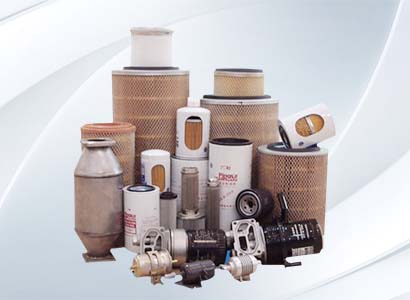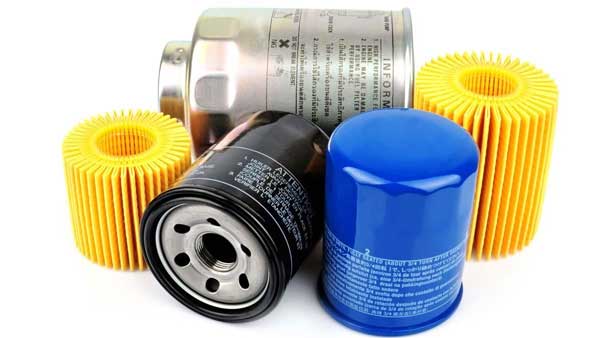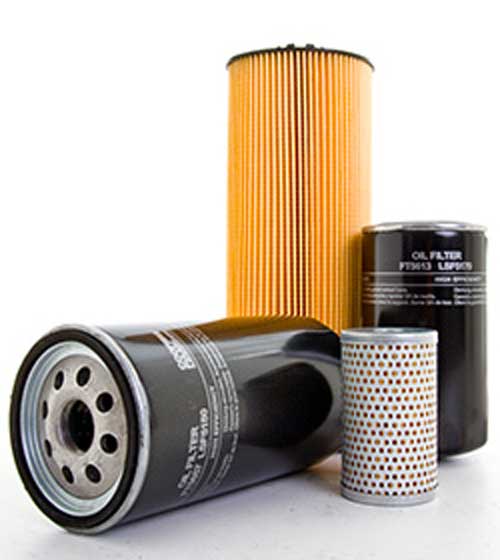Engine oil filter applications in automobiles. Here are some important points:
Filter impurities in lubricating oil: During the circulation process of lubricating oil in the engine, it will come into contact with various metal parts and may take away some metal shavings, combustion residues and other impurities. At the same time, due to the high temperatures generated during the combustion process, some components in the lubricating oil may decompose to produce sediment and colloidal substances. If these impurities are not removed in time, they will form deposits inside the engine, reducing the oil pressure and affecting the engine's lubrication and cooling performance. The engine oil filter is designed to solve this problem. It filters out impurities in the oil through micropores, keeps the oil circuit open, and ensures that the lubricating oil can effectively lubricate and cool the engine.
Prevent engine parts from wearing: The parts in the engine will generate high heat when moving at high speed. It is the cooling effect of lubricating oil that protects them from overheating. However, if the impurities in the lubricating oil cannot be removed in time, these hard particles will cause violent impact on the engine parts while moving at high speed, accelerating the wear of the parts. Therefore, engine oil filters play a vital role in preventing early wear of engine parts.
Extend oil change intervals: Filters play an important role in keeping the oil clean and protecting the engine, and clean oil allows the engine to run more efficiently. This will help extend your oil change intervals. Clean oil not only helps improve fuel efficiency but also reduces maintenance costs because extended oil change intervals mean less frequent oil and filter replacements.
Improve vehicle performance and fuel efficiency: During the combustion process, clean oil can ensure more complete and efficient combustion, which can improve fuel efficiency to a certain extent. Moreover, the oil filter removes tiny impurities so that the lubricating oil can flow smoothly to every corner of the engine, including some key components such as camshafts and valves. In this way, whether in daily driving or under high speed and heavy load conditions, the normal operation of the engine can be ensured, thereby improving vehicle performance.
Overall, the application of engine oil filters in automobiles is very important. Its function is not only to filter out impurities in lubricating oil, but also plays a key role in maintaining vehicle performance, preventing early engine damage, and improving fuel efficiency.

The basic working principle of the engine oil filter can be divided into the following steps:
Oil intake: When the engine starts running, the lubricating oil pump draws oil from the oil pan and then delivers the oil to the oil filter. These lubricants may contain various impurities generated during engine operation, such as metal shavings, dust and dirt.
Filtration process: The filter consists of a housing and an inner filter element. When lubricating oil enters the filter element from the oil pump, it will first enter the outside of the filter element and then flow inwards. During the filtration process, the microporous structure of the filter element captures and leaves particles and impurities larger than a certain size on the surface, and only small enough particles and clean oil can pass through.
Clean Oil Returns to Engine: Once the oil has passed through the filter element and been cleaned, it returns to the engine from the filter's center tube. At this point, the oil is clean and can safely lubricate the engine.
The function of the bypass valve: In some cases, if the filter element cannot work properly due to blockage or the viscosity of the lubricating oil is too high in cold weather, the filter bypass valve will open. This means that some unfiltered oil can continue to flow into the engine, preventing interruptions in the oil supply. While this may introduce some contaminants, it's still much better than no lube at all.
Prevent oil backflow: Most oil filters are equipped with a reverse valve to prevent oil backflow, which means that when the engine is shut down, the lubricating oil will not flow back to the filter, ensuring that the lubrication will be the same when the engine is started next time. The system can immediately build up oil pressure to provide lubrication.
Through this series of processes, the engine can receive a continuous, stable and clean supply of lubricating oil to meet its operating needs under various conditions. This not only helps improve engine efficiency and extend its service life, but also reduces maintenance costs. This is how an engine oil filter works and its importance in car maintenance.
The advantages and advantages of engine oil filters are very obvious, covering the following key aspects:
Filtration capacity: The primary function of the engine oil filter is to filter out various impurities in the lubricating oil, including dust, metal fragments, particles produced by combustion and other pollutants. Even under high pressure and temperature, the filter can maintain its good filtration performance, ensuring the quality of lubricating oil and providing effective protection for the engine.
Keep the lubricating oil clean: The engine oil filter can effectively maintain the cleanliness of the lubricating oil. This not only ensures that the various components inside the engine are kept clean, but also reduces the damage of pollutants to the lubricating oil, thereby extending the service life of the lubricating oil. .
Improves engine performance: Filters can improve your engine's overall performance and efficiency by protecting your engine's critical components by eliminating those tiny particles that can scratch engine parts. Clean fuel better lubricates engine components, reduces frictional heat and prevents excessive wear.
Extended equipment life: By maintaining the cleanliness and quality of lubricating oil, engine oil filters help reduce wear and tear on engine components caused by impurity contamination, thereby increasing equipment life and reducing maintenance costs.
Small flow resistance: High-quality engine oil filters are usually designed with small flow resistance, which means that the oil flow can pass through the filter smoothly, reducing the load on the pump, increasing the oil pressure, and ensuring the normal operation of the engine lubrication system.
Long service life: Due to the use of high-quality filter elements and tight sealing designs, engine oil filters are usually guaranteed to maintain their filtration effect for the next several thousand kilometers, reducing the frequency of replacement.
Bypass Valve and Reverse Check Valve: Many advanced engine oil filters have special bypass valves and reverse check valves. The bypass valve can still ensure the supply of lubricating oil when the filter element is clogged; the reverse check valve can prevent the oil from flowing back after the engine is turned off, so that oil pressure can be established immediately when the engine is started again.
Therefore, it can be seen that the engine oil filter plays an important role in the operation and maintenance of the car. It can effectively improve the performance of the engine, extend the service life of the equipment, reduce maintenance costs, and ensure the smooth operation of the engine.

The engine oil filter is mainly designed to filter and remove various impurities in the engine lubricating oil, thereby avoiding wear and even possible damage to the engine caused by these impurities. These filtered impurities mainly include the following categories:
Dust and silt: This includes dust and silt that is drawn into the engine from the air, as well as dust and silt that is blown up from the ground and eventually enters the engine. If these particulate matter enters the engine, it can cause scratches on engine components and cause greater mechanical wear.
Metal Particles: The flow of lubricating oil inside the engine causes tiny friction between engine parts, which creates tiny metal particles. If these metal fragments are not filtered out in time, they will further increase the wear and tear inside the engine.
Combustion residues: When an internal combustion engine burns fuel, it will produce some incomplete combustion residues, which may be mixed into the lubricating oil. If not removed in time, it may have a negative impact on the lubrication environment inside the engine.
Carbon deposits: During the operation of the engine, some incompletely burned fuel will produce carbon particles, which will mix with the lubricating oil to form carbon deposits. These carbon deposits will cause the lubricating oil to thicken and affect the lubrication effect.
Lubricating oil decomposition products: Under long-term operation, high temperature and high pressure will cause the lubricating oil to oxidize, and the generated acids, colloids and other substances will also be mixed into the lubricating oil, affecting the lubricating performance of the lubricating oil.
Coolant: In some rare cases, if the cooling system fails, coolant can seep into the lubrication system. Mixing coolant and lubricating oil will create an emulsion, which will greatly reduce the lubrication effect and may cause serious engine damage in extreme cases.
In summary, engine oil filters play a vital role in keeping lubricating oil clean, protecting engine performance and extending engine life cycle.
Engine oil filters usually need to be replaced after a specific mileage, not based on time. In other words, it mainly depends on how many kilometers your car has actually driven, not how long the filter has been used. Here are some guidelines on when your engine filter needs to be replaced:
If your car has traveled about 5000 kilometers: It is a general rule that once your car has traveled 5000 kilometers, you should consider changing the engine filter. This is because as the mileage increases, there will be more and more impurities in the engine oil, and the screen part of the filter will gradually become clogged, affecting its filtration effect.
Change it at the same time as your engine oil: Every time you change your engine oil, you should also replace your oil filter. This is because new engine oil will remove some impurities from the engine, and most of these impurities will be trapped by the filter. If the filter is not replaced, impurities in the old filter may be washed into the new oil, affecting the lubrication performance of the new oil.
When the vehicle has driven less miles, but a long time has passed: for example, it has only been driven 3,000 kilometers in half a year, but the oil has expired, and it is time to change the oil, usually together with the oil filter.
High-performance filter elements may last longer: High-performance filter elements may have longer replacement intervals, such as 10,000 kilometers, or even 25,000 kilometers, but this needs to refer to the recommendations of the car manufacturer or filter element manufacturer. These replacement intervals This is usually written on the product packaging.
In general, the frequency of filter changes depends mainly on the specific driving conditions of your vehicle and the type of filter element you use. The above guidelines can be used as general rules, but should also be combined with the vehicle manufacturer's recommendations, as well as the oil filter's specifications. Using environment, such as the vehicle operating in a dusty or humid environment, it may need to be replaced in advance.

When choosing the material of an engine oil filter, the most important things to consider are its filtration efficiency, service life and adaptability to specific operating conditions. Here are some common filter materials and factors to consider when choosing:
Filter paper: Filter paper is the most common filter material. It is able to filter out many contaminants without affecting oil flow. When selecting a paper filter, look to see if it is uniform, not damaged, and if the oil flow rate meets the needs of the engine.
Fiberglass: Fiberglass has higher filtration efficiency and longer service life, but is generally more expensive than filter paper. It is usually used in engines with higher cleanliness requirements or harsher operating conditions.
Polypropylene (PP) cotton: PP cotton also has a certain filtering effect, but it is not used much in vehicle oil filters. It is used more in household filtration devices such as air purifiers and water filters.
Stainless steel mesh: Stainless steel mesh can provide good filtration efficiency and can be cleaned and reused, which may be more economical in the long run. However, the initial cost is higher and it is usually used for high-end cars or some special applications.
In addition, when choosing an oil filter, you should also pay attention to the following points:
Filtration performance: This is the most important factor in choosing a filter. A good filter should be able to effectively remove contaminants without affecting the flow of oil.
Tank material: The tank should be strong enough to withstand the pressure and temperature of the engine.
Lifespan: Quality filters generally have a longer lifespan. Long life can reduce replacement frequency, saving cost and time.
Make and model: It is recommended to try to choose a make and model of filter that matches your car. Different models may require different filters, and using a well-adapted filter can ensure its performance and effectiveness.
Finally, remember to check the product’s quality assurance and certifications. This ensures that the product you choose meets relevant standards and can effectively protect your engine from damage by contaminants.
How to choose the material of the engine oil filter depends on some major factors, including temperature resistance, corrosion resistance, porosity, mechanical strength and whether it has a check valve. These factors will be explained in more detail below so that you can better understand:
Temperature resistance: When the engine is running, the temperature of the engine oil may reach more than 200 degrees Celsius. Such high temperatures may deform some filter materials or cause chemical reactions. Therefore, the material of the engine oil filter needs to have high temperature resistance, not easily deformed at high temperatures, and will not produce harmful substances under high temperature conditions. Some optional temperature-resistant materials include high-temperature and heat-resistant synthetic fiber materials, special plastic materials, etc.
Corrosion resistance: Engine oil may contain fuel, acidic substances, moisture, etc., which may corrode the filter material. Therefore, the material of the engine oil filter needs to have good corrosion resistance and can work for a long time in oil containing various corrosive substances without reducing the filtration effect. Corrosion-resistant materials such as stainless steel, special alloys, certain synthetic materials, etc. are all good choices.
Porosity: Porosity is an important parameter to measure the filtration performance of the filter. Filter materials with higher porosity have larger filtration area and higher filtration efficiency. However, too high a void ratio may allow excessively large contaminants to pass through, affecting the filtration effect. Therefore, on the premise of ensuring the filtration effect, appropriately increasing the porosity of the filter material can improve the fluidity of the oil and reduce the resistance when the oil passes through the filter.
Mechanical strength: Since engine oil usually needs to withstand high pressure in the engine, the filter material must have sufficient mechanical strength to work under high pressure without deformation or rupture. Some materials with high mechanical strength such as metal filters, special strength fiber paper, etc.
Check Valve: A check valve is a device that prevents reverse flow of oil. With the check valve, when the engine stops, the oil will not flow back to the fuel tank, so that when the engine is started next time, the oil pressure can be quickly established to provide smooth lubrication to the engine. Not all filters have check valves. Whether a filter with a check valve is needed depends on the characteristics of the engine and the use environment.
These factors are only some of the factors that should be considered when selecting an engine oil filter. They also include other factors such as filtration accuracy, filter size and structure, flow requirements, price, usage environment and other factors. You can weigh these factors and choose the most suitable engine oil filter based on your actual situation and needs.








